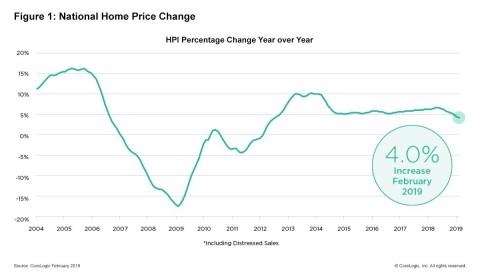- Annual change by state ranged from a 10.2 percent high in Idaho to a -1.7 percent low in North Dakota
- The HPI Forecast indicates a pickup in prices after some initial moderation
- Home-price growth is trending slower in 2019 than during the same time period in 2018
IRVINE, Calif. — (BUSINESS WIRE) — April 2, 2019 — CoreLogic® (NYSE: CLGX), a leading global property information, analytics and data-enabled solutions provider, today released the CoreLogic Home Price Index (HPI™) and HPI Forecast™ for February 2019, which shows home prices rose both year over year and month over month. Home prices increased nationally by 4 percent year over year from February 2018. On a month-over-month basis, prices increased by 0.7 percent in February 2019. ( January 2018 data was revised. Revisions with public records data are standard, and to ensure accuracy, CoreLogic incorporates the newly released public data to provide updated results each month.)
This press release features multimedia. View the full release here: https://www.businesswire.com/news/home/20190402005046/en/

CoreLogic National Home Price Change; February 2019. (Graphic: Business Wire)
Looking ahead, after some initial moderation in early 2019, the CoreLogic HPI Forecast indicates home prices will begin to pick up and increase by 4.7 percent on a year-over-year basis from February 2019 to February 2020. On a month-over-month basis, home prices are expected to decrease by 0.5 percent from February 2019 to March 2019. The CoreLogic HPI Forecast is a projection of home prices calculated using the CoreLogic HPI and other economic variables. Values are derived from state-level forecasts by weighting indices according to the number of owner-occupied households for each state.
“During the first two months of the year, home-price growth continued to decelerate,” said Dr. Frank Nothaft, chief economist for CoreLogic. “This is the opposite of what we saw the last two years when price growth accelerated early. With the Federal Reserve’s announcement to keep short-term interest rates where they are for the rest of the year, we expect mortgage rates to remain low and be a boost for the spring buying season. A strong buying season could lead to a pickup in home-price growth later this year.”
According to the CoreLogic Market Condition Indicators (MCI), an analysis of housing values in the country’s 100 largest metropolitan areas based on housing stock, 35 percent of metropolitan areas have an overvalued housing market as of February 2019. The MCI analysis categorizes home prices in individual markets as undervalued, at value or overvalued, by comparing home prices to their long-run, sustainable levels, which are supported by local market fundamentals (such as disposable income). Additionally, as of February 2019, 27 percent of the top 100 metropolitan areas were undervalued, and 38 percent were at value.
When looking at only the top 50 markets based on housing stock, 40 percent were overvalued, 18 percent were undervalued and 42 percent were at value in February 2019. The MCI analysis defines an overvalued housing market as one in which home prices are at least 10 percent above the long-term, sustainable level. An undervalued housing market is one in which home prices are at least 10 percent below the sustainable level.
During the first quarter of 2019, CoreLogic together with RTi Research of Norwalk, Connecticut, conducted an extensive survey measuring consumer-housing sentiment in high-priced markets. In all, 62 percent of residents in high-priced markets acknowledged that housing in these markets was unaffordable, compared to only 11 percent of respondents across all markets surveyed last year. Nearly three quarters of renters (71 percent) in these high-priced markets felt their housing costs were unaffordable, compared to just 16 percent of renters across all markets last year. High-priced markets were identified as the 15 metropolitan areas with the highest median home prices. The study focused on the dynamics of housing decision making and the impact that the housing market had on the attitudes and perceptions of residents in high-priced markets.
“About 40 percent of the top 50 largest metropolitan areas in the country are now categorized as overvalued and we expect that percentage to grow over the remainder of 2019. The cost of either buying or renting in expensive markets puts a significant strain on most consumers,” said Frank Martell, president and CEO of CoreLogic. “Our research tells us that about 74 percent of millennials, the single largest cohort of homebuyers, now report having to cut back on other categories of spending to afford their housing costs.”
The next CoreLogic HPI press release, featuring March 2019 data, will be issued on Tuesday, May 7, 2019 at 8:00 a.m. ET.
Methodology
The CoreLogic HPI™ is built on
industry-leading public record, servicing and securities real-estate
databases and incorporates more than 40 years of repeat-sales
transactions for analyzing home price trends. Generally released on the
first Tuesday of each month with an average five-week lag, the CoreLogic
HPI is designed to provide an early indication of home price trends by
market segment and for the “Single-Family Combined” tier, representing
the most comprehensive set of properties, including all sales for
single-family attached and single-family detached properties. The
indices are fully revised with each release and employ techniques to
signal turning points sooner. The CoreLogic HPI provides measures for
multiple market segments, referred to as tiers, based on property type,
price, time between sales, loan type (conforming vs. non-conforming) and
distressed sales. Broad national coverage is available from the national
level down to ZIP Code, including non-disclosure states.

